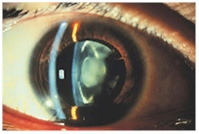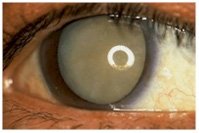Cataract Surgery
Cloudy, unclear vision? Difficulty reading, recognising faces, or seeing the television or road signs? Glasses constantly needing to be changed or not improving the vision? Glare or dazzle from lights at night? You may well have cataracts.
 |
|
 |
| Moderate Cataract |
|
Advanced Cataract |
What is a cataract?
A cataract is a clouding of the lens inside your eye. The lens is a clear structure just behind the iris (the coloured part of the eye). It helps to focus light to form a clear image on the retina at the back of the eye in much the same way as the lens in a camera focuses light onto a film. When a cataract develops your vision deteriorates because the eye can no longer form a clear image on the retina. A cataract is not a layer of skin that grows over your eye. Many people over 60 have some cataract and the vast majority can be treated successfully.
How does cataract affect your sight?
Blurry sight - This is very common. You may notice that your sight has become blurred or misty, or that your glasses seem dirty or appear scratched.
Dazzle - You may be dazzled by lights, such as car headlamps, and sunlight.
Change of colour vision - Your colour vision may become washed out or faded.
Occasionally the pupil becomes noticeably grey or white.
What causes a cataract?
Cataracts can form at any age. Most are due to ageing. Some are due to other eye diseases such as inflammation inside the eye, trauma or previous radiotherapy or steroid treatment, or other diseases such as diabetes. Children are occasionally born with cataracts.
What treatment is available?
The most effective treatment for cataracts is an operation to remove the cloudy lens. Diets or drugs have not been shown to slow or stop the development of cataract. Cataract surgery is now the most commonly performed operation in the UK. You probably know someone who has had cataracts removed.
When should I have the operation?
In the past, eye surgeons often waited until the cataract became ‘ripe’ and your vision was very poor before suggesting you had the cataract removed. With modern surgery, the operation is usually now carried out as soon as your eyesight interferes with your daily life and your ability to read, to work, to drive or do the things you enjoy. You will probably want to consider surgery if this is the case.
If you are a driver you must reach the visual standard required by the Drivers and Vehicle licensing Authority and it may be necessary to have the cataract removed in order to keep your licence.
What happens during the operation?
Huge progress has been made in cataract surgery. In most cases the cataract can now be removed quickly, safely and painlessly and a clear new lens (implant) placed inside your eye to restore sight. Prior to the operation you will be given eye-drops to enlarge the pupil. Cataract surgery is usually performed with a local anaesthetic but a general anaesthetic is occasionally used. With a local anaesthetic you will be awake during the operation but the eye will be completely numb. The anaesthetic usually consists of eye drops.
During the operation you will be asked to keep your head still, and lie as flat as possible. You will not be able to see any detail but will be aware of movement, a bright light and occasionally coloured flashes. The operation usually takes about 15-20 minutes.
Modern cataract microsurgery uses a technique called phaco-emulsification to remove the lens. A fine probe is inserted which uses ultrasound energy to soften and remove the cataract. A permanent artificial lens implant made of clear plastic polymer is then inserted. Stitches are rarely required as the small wound rapidly self-seals. At the end of the operation, a pad or shield is placed over the eye to protect it.
What happens after the operation?
Most people notice a rapid improvement in eyesight. It is normal to feel some itching and grittiness of the eyelids and mild discomfort for a while after cataract surgery. After 2 - 3 days even mild discomfort should disappear. Most people will have the operation and go home on the same day, and will be able to carry on with most normal daily activities. You will normally have a follow-up appointment 1–3 weeks after your operation. You will be given eye drops to help the eye settle down.
What are the benefits and risks of cataract surgery?
Cataract surgery is one of the most successful operations and the vast majority of patients have an improvement in their vision. There is usually greater clarity and sharpness and you will probably also notice colours being brighter and clearer. Overall quality of life usually improves, often dramatically where cataracts are significantly compromising vision.
The benefits of surgery may be limited where vision has been lost due to other eye conditions such as glaucoma, diabetes or age-related macular degeneration though, depending on the level of cataract present, it may still be worthwhile.
Cataract surgery is a very safe procedure but in common with other operations, you should be aware that there is a small risk of complications, either during or after the operation, although most can be treated effectively.
One of the most common complications (approximately 20%) is a thickening of the lens capsule that supports the new lens implant (posterior capsule opacification). This reduces vision in a similar way to a cataract and may occur any time in the first few years after the operation. It is easily corrected with laser treatment.
Will I need glasses after the operation?
Whilst the main aim of cataract surgery is to improve eyesight modern techniques also allow for correction of long- and short-sightedness and astigmatism to minimise or occasionally avoid the need for glasses following surgery. Reading glasses are usually needed for close work.
Who am I? And why should you trust your eye health to me?
My name is Andrew Pearson and I am a Consultant Eye Surgeon - my NHS practice is based at the Royal Berkshire Hospital, Reading and the Prince Charles Eye Unit, Windsor.
I always see private patients personally and at your convenience – usually within the week. I have performed several thousand successful cataract operations, frequently see complex or difficult cases, and (in the NHS) am involved in training new ophthalmologists in cataract surgery.
What do other patients say?
Thank you very much for taking care of my cataracts....This has given me a new life and I cannot say how grateful I am.
May I please convey my sincere thanks to you and all the members of your staff for carrying out my cataract operation. I am delighted with the outcome.
I am so pleased to be able to tell you that I have now received my new driving license!! This is due largely to your personal attention and also the considerable efforts of your staff.
Very many thanks for the excellent care and attention that you have recently provided to my wife in her two cataract operations. We are both delighted with the results, especially so that she now has perfect sight in both eyes.
I cannot thank you enough for removing my two cataracts….The improvement in my eyesight is really wonderful…I had been dreading the operation….wish that I had had the operation earlier.
Thank-you very much for carrying out the recent operation with such care and attention. I can see everything much more clearly now and have excellent all round vision.
A couple of months have now passed since I had my cataract surgery….. can report that my eyesight is now perfect.
I can see clearly now, as the words of the song goes, now the mist has lifted. I feel so grateful for the operation.
wanted to say a big thank-you to you and your staff for the care and attention I received (whilst an out-patient). I can now read the newspaper and magazines-it’s wonderful.
Thank-you so very much for the successful cataract operation you carried out on my left eye in January…. I can see clearly for driving and other every-day activities
How do I make an appointment?
I see patients privately at:
Circle Hospital, Reading
100 Drake Way
Reading
RG2 0NE
The Princess Margaret Hospital, Windsor
Osborne Road
Windsor
Berkshire SL4 3SJ
Spire Thames Valley Hospital
Wexham Street
Slough
SL3 6NH
To arrange an expert assessment of your eyes simply contact my secretary Susanna Morys:
Tel: 01753 841567
Email: Click here to email
Your eye health is extremely important – don’t delay, make an appointment TODAY.
Click here for map locations of the hospitals above